So graduation season is long gone and you’ve spent the summer relaxing, revisiting all those graduation pictures (untagging those terrible ones of you on Facebook), and maybe, as summer comes to a close, you’ve been watching some motivational TED Talks and commencement speeches. You know the ones by Steve Jobs, Jim Carrey, J. K. Rowling…
Which reminds you, it might be time to consider applying to the 143 different internships opportunities that you’ve saved over the past few months.
Or not.
Fresh graduates and students make a lot of common mistakes during their job hunt that can end up costing them a great, well-suited opportunity.
Auto-applying to hundreds of opportunities without having given your application materials or the job description much thought means securing zero placements. And it doesn’t help that thousands of other graduates are doing the same.

So how do you make yourself and your application stand out? Let’s walk through the steps for a successful job hunt.
Tip 1: Research, research, research
This goes without saying. Before you begin anything, exams, interviews, job searches, you need to put in a good amount of research to figure out what you need to know, what you want to achieve, and who you need to reach out to for support.
- Make a list of industries that you would like to work/gain experience in
- Search for specific businesses in the UAE that you would like to work for
- Check out their website career pages, LinkedIn profiles, and check if they have any openings on Oliv
- If the companies don’t have public job openings, figure out who you need to reach out to via email or LinkedIn
Tip 2: Get creative before you begin sending your apps
In the Middle East, reaching out to family and friends comes first. Job seekers tend to ask people they know for opportunities and end up taking on irrelevant roles or roles where they won’t gain any useful experience. They also end up missing out on the opportunities that would have been better-suited.
You’ve heard all the cliches of job-hunting and internship-searching: networking, information sessions, 15-minute coffees, creative resumes donut boxes… the list is endless.
But that fact is that none of those are actually clichés. They’re some of the best ways to connect with prospective employers and opportunities. So as you’re beginning your search, think about how you can get creative.
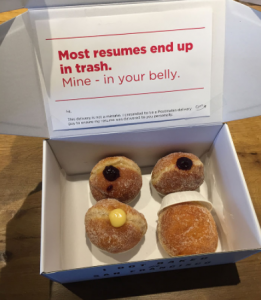

Tip 3: Talk to your professors
Another strategy, that fresh graduates always forget, is speaking to professors. Professors teach students about the A-to-Z of their field for a reason: they’re experts (in theory and in practise)! They almost always have years of work experience in the field, are very well-connected to other professionals, and are always open to help students with referrals. The same goes for advisors, faculty members, and alumni.
Meet your professors over coffee or during their office hours about their career path, your career goals, the industry landscape in the region, anything you want to know!
Think along these lines:
- What were you doing when you were graduating/recently graduated?
- What’s something that not many people know about working in [your field]?
- What’s the best way to get your foot in the door in [your field/field you’re interested in]?
- In your opinion, who would be the best people to talk to in [your field]?
- What’s your favourite/least favourite thing about [your field]?
Use those questions as prompts. The goal of these conversations is to learn as much as you can, not to get a job.
Tip 4: Work the digital space
You may have heard the saying, “work the room” – to engage and communicate with multiple in one space, e.g. at a networking event. Job seekers are no longer limited to engaging with people in physical rooms. All social media channels have the potential to be treated as networking events so working the “digital room” is crucial.
Digital Profiles
Every single professional should have a LinkedIn profile that represents the best side of them:
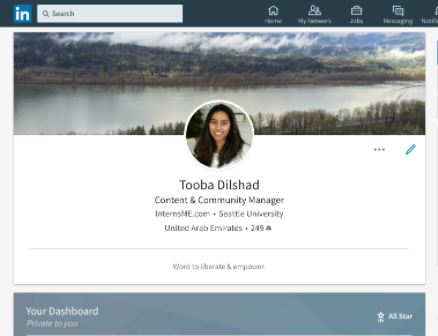
And if you have an Oliv profile, make sure you fill it up completely.
Your digital profile shouldn’t just have fluff about your major, university, and a note about wanting to work for a “reputed company”. Your ‘About Me’ section is an opportunity to showcase your uniqueness – your personality, passion, and aspirations.
Let’s practise:
Bad: I am a graduate from Oliv University, looking for job in business
Good: I’m a Human Resources graduate from Oliv University, looking for internship or entry-level opportunities in HR or Conflict Resolution in Dubai.
Awesome: Hello! My name is [name]. I’m a recent grad from Oliv University with a major in Human Resources and minor in Psychology. I’m on the lookout for an opportunity that’ll let me merge together my passion for HR and psychology, and kickstart a career in Conflict Resolution/Crisis Communication. I enjoy the challenge of working with different types of people and coming up with solutions to difficult problems. It helps that I have a knack for staying calm during a storm!
Here’s what mine looked like:
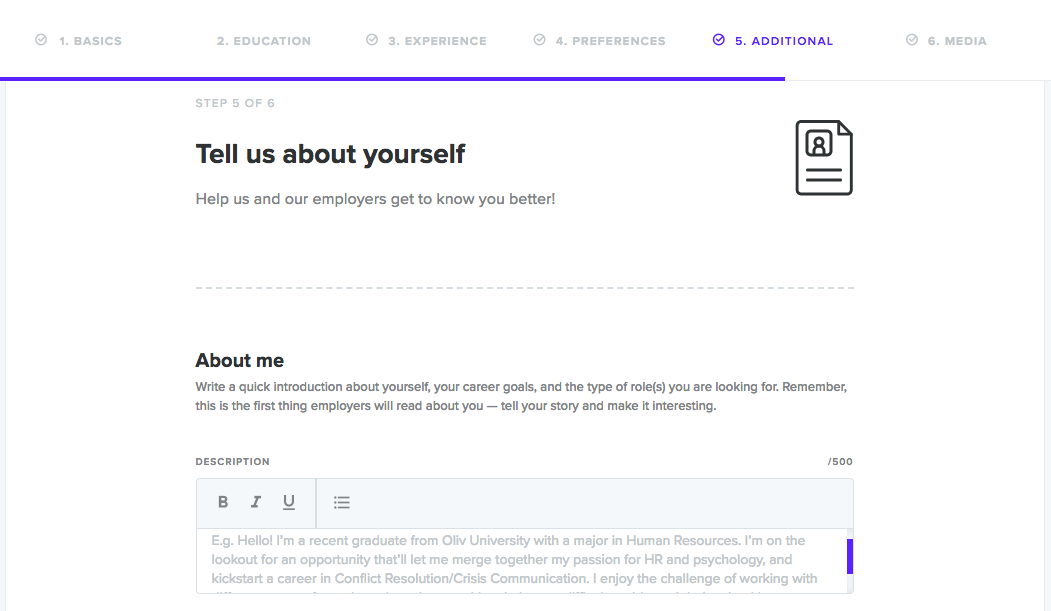
Try and do the same for your Twitter and LinkedIn profile – challenge yourself to consolidate your ‘About Me’ section into a sentence or 15-20 words.
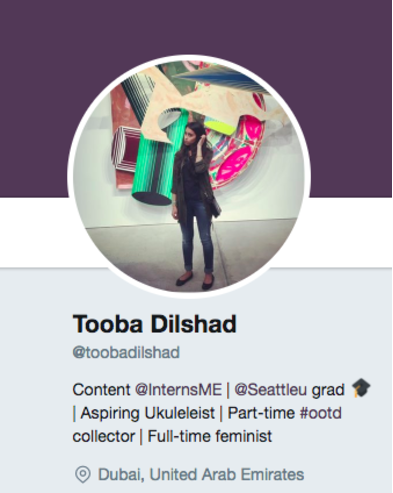
Don’t forget to Google yourself and hide away those unflattering Facebook pictures before an employer sees them.
And remember, one of the greatest LinkedIn mistakes: Snapchat filtered-selfies. These shouldn’t even get close to your LinkedIn or Oliv profiles. Ever. They’re extremely unprofessional and make you seem like you’re not really taking your career seriously.

Mona Lisa Selfie
Digital Networking
While you may mostly be using Instagram, Facebook, and Twitter for flatlays of your brunch, photo albums from that summer in Sri Lanka, or to unleash some frustration about job-hunting in the UAE via a Twitter rant, they’re all still valuable employment and networking tools.
Whether you have LinkedIn InMail credits or not, you can reach out to professionals via connect – just make sure you send a personalized message. There is no greater LinkedIn faux pas than sending a connection request to a professional who you have either never met/don’t know well, without a message.
Twitter is not far behind with its networking and job-finding potential. Don’t be afraid to reach out for a quick informational interview or respond to a job posting:
Here are some real examples of messages I’ve sent in the past for:
Informational interviews:
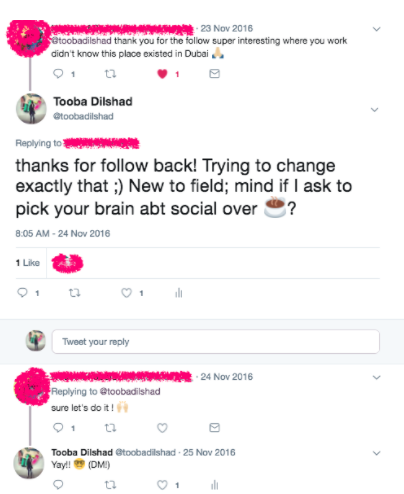
Internship applications:
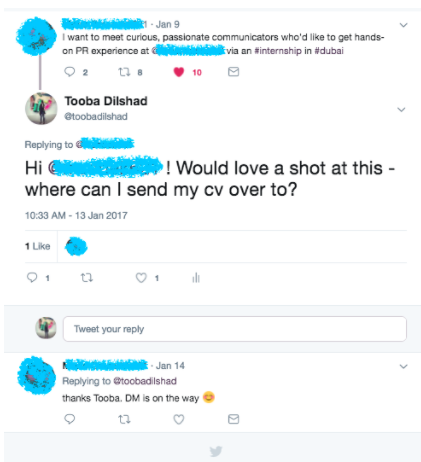
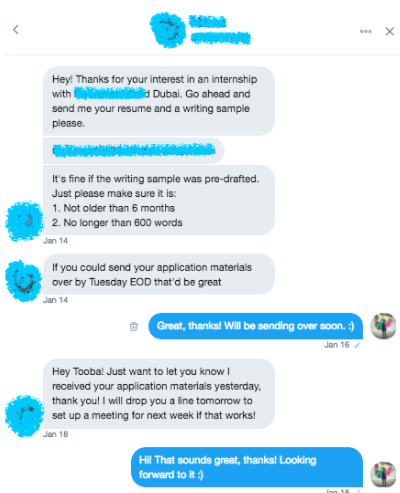
And reaching out on LinkedIn:
“Hi [first name],
Hope you’re doing well! My name is Tooba and I’m a recent graduate from Seattle University. I majored in Strategic Communications and am trying to get my foot in the door of content marketing. I noticed you recently worked on the [ ] content campaign at [ ], which was really amazing because [ ].
I’d love to talk to you about how that that creative process was for you, especially in the Dubai market.
or
I’d love to talk to you about internship or entry-level opportunities in content or digital marketing at [ ] and I’d be happy to send across my CV and writing sample to you.
Looking forward to hearing back.
Thank you!”
Digital Discussion
Take advantage of industry groups, professional organizations, alumni associations, articles, and discussions on LinkedIn, and participate in them, ask questions. At this stage of your career, you won’t be the expert in your field but as a student or recent graduate, your experience and opinions are valuable to employers because they bring fresh ideas and challenges.
Tip 5: Learn to pitch yourself
As a budding, young professional, you’ll have everything but the years of work experience to pitch yourself, and where you lack in work experience, you can make up for with voluntary, promotional, extracurricular, internship, or leadership experiences. Learn to pitch yourself at networking events, university events, career fairs, workshops etc.
“My name is [name] and I’m currently working on my B.A. in Business and Finance at Heriot-Watt, with a minor in psychology. I really enjoy finance and writing, and I have been the financial officer of the Student Council for two years where I’ve been learning to manage and appropriate budgets to various clubs. Last summer, I interned at Emirates NBD bank in the Risk Management department where I fell in love with investment evaluation and forecasting, and I’m hoping to begin a career in content writing at an investment firm after graduation next month.”
Tip 6: Keep your CV to one page
Your resume/CV, at this level, should always be a single page. Even if you’ve interned with United Nations, volunteered at NASA, and studied abroad in three different countries (in which case you should get rid of the other stuff in your resume!). Entry-level candidates are not expected to have extensive work experience but are expected be able to demonstrate how their experiences have helped them develop their skills. CV-writing can be a beast of its own, learn to tackle it here.
Tip 7: Focus and apply selectively
No candidate should ever apply to every single job or internship that they set their eyes on. This is a red flag to employers (and us!) – it shows a lack of focus and career direction. Apply to the positions you feel passionate about and tailor your application materials (especially your cover letter) to the role you’re applying for. This means 10 jobs = 10 cover letters.
Tip 8: Show your personality, understand their culture
Don’t be afraid to show your personality in your cover letters, over the phone, and during interviews. If there’s one thing that employers are looking for in candidates, it’s a friendly personality, specifically for that personality to be a culture fit. Employers don’t just want someone smart to do the job, they want them to get along with the rest of the team, add to the atmosphere positively, and have fun! The job hunting process is like making a friend. You need employers to like you. This means you need to understand the culture and nature of the company you’re applying to (and pay attention to the language they use across their online platforms, especially social media, quality of posts, their target audience).
For example:
Startup culture is far more casual in dress code, communication, and structure. Reaching out to a startup or another smaller company may need to sound like this:
“Hi [name]! Hope you’re doing well. I’m a recent graduate from Oliv university, I just came across your post about an opening on the marketing team at [startup organization] and I wanted to know if I could have a quick chat with you about the position?”
Because the company culture is similarly casual:
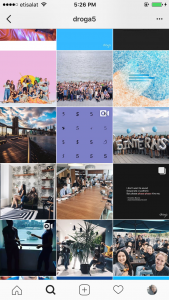
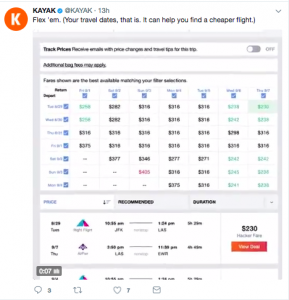
That’s opposed to a corporate organization (especially financial or banking sectors) where your communication style should be more formal:
“Hello [name], my name is [your name] and I’m a recent graduate from Oliv University with a B.A. in Marketing. I am interested in the ‘[job title]’ at [company] as I have a passion for [……………]. I would love to be considered for the position and send a formal application. Please let me know who I can send my CV and cover letter. Looking forward to hearing back from you.”
Because the culture and language is more formal:
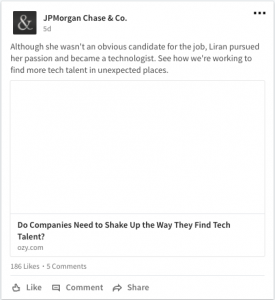

Use your research to adjust your voice and your level of expression of personality in your outreach.
There is a generational difference between the way current mid/senior-level professionals communicate and the way junior/entry-level candidates communicate – a slightly more casual approach is acceptable for the youth – take advantage of it!
Approaches like “Dear Sir/Madam”, “esteemed/reputed company”, or “please accept my application for this job” carry an air of simultaneous carelessness and desperation that is off putting for employers.
Tip 9: “Interested”
There’s only one situation where it is completely acceptable to say “interested” underneath an internship or jobs opportunity and that’s never.
Saying “interested” doesn’t add any value to the original post. It doesn’t make you stand out from the rest of the comments or show your eagerness and communication skills. The goal with responding to opportunities is to make yourself stand out from the rest of the crowd and be able to get contact details to send your application across.
Bad: “Interested” or “Pls check my profile” (These aren’t bad; they’re terrible.)
Good: Where can I send my CV for this?
Awesome: Hi! This sounds like a great opportunity, I’d love to know more about it, who can I connect with at [company name]?
Those are our top job searching tips for the UAE – now get hunting!
